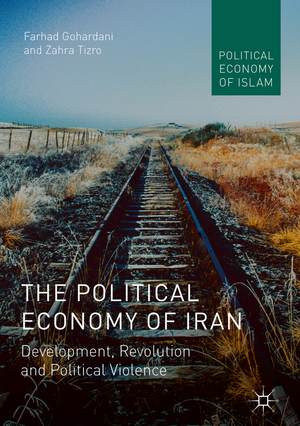The Political Economy of Iran: Development, Revolution and Political Violence: Political Economy of Islam
Autor Farhad Gohardani, Zahra Tizroen Limba Engleză Hardback – 18 mar 2019
Preț: 589.97 lei
Preț vechi: 694.09 lei
-15% Nou
Puncte Express: 885
Preț estimativ în valută:
112.91€ • 117.44$ • 93.21£
112.91€ • 117.44$ • 93.21£
Carte tipărită la comandă
Livrare economică 15-29 aprilie
Preluare comenzi: 021 569.72.76
Specificații
ISBN-13: 9783030106379
ISBN-10: 3030106373
Pagini: 274
Ilustrații: XIX, 343 p. 1 illus.
Dimensiuni: 148 x 210 mm
Greutate: 0.59 kg
Ediția:1st ed. 2019
Editura: Springer International Publishing
Colecția Palgrave Macmillan
Seria Political Economy of Islam
Locul publicării:Cham, Switzerland
ISBN-10: 3030106373
Pagini: 274
Ilustrații: XIX, 343 p. 1 illus.
Dimensiuni: 148 x 210 mm
Greutate: 0.59 kg
Ediția:1st ed. 2019
Editura: Springer International Publishing
Colecția Palgrave Macmillan
Seria Political Economy of Islam
Locul publicării:Cham, Switzerland
Cuprins
1. Chapter 1 Introduction.- 2. Chapter 2 Theoretical Framework.- 3. Chapter 3 The Theoretical Model of the Iranian Modern History.- 4. Chapter 4 Tragedy of Confusion.- 5. Chapter 5 Formation of Unstable Coalitions.- 6. Chapter 6 Institutional Failure.- 7. Chapter 7 Chaotic Order.- 8. Chapter 8 Conclusion.
Notă biografică
Farhad Gohardani is an economist who has worked as a researcher on socio-economic development in Iran, at the University of York and York St John University. He is also a Media Commentator in the UK.
Zahra Tizro is Senior Lecturer at University of East London (UEL), UK.
Textul de pe ultima copertă
The book explores the relation between truth, trust and wealth in the modern history of Iran, and provides an up-to-date theoretical understanding of Iran and investigates the lack of stability, development and wealth creation in the country. Tragedy of confusion alongside unstable coalitions, frequent crises and socio-political violence result in an inability to build a solid foundation for the process of wealth creation via generation of trust in institutions. Drawing upon the latest research in economics, psychology, politics and philosophy, this study offers a new theoretical framework for interpretation of the Iranian modern history and its troubled experience of development. This monograph will appeal to researchers, scholars, graduate students, policy makers and anyone interested in the Middle Eastern politics, Iran, development studies and political economy.
Farhad Gohardani is an economist who has worked as a researcher on socio-economic development in Iran, at the University of York and York St John University. He is also a Media Commentator in the UK.
Zahra Tizro is Senior Lecturer at the School of Psychological and Social Sciences, York St John University, UK.
Caracteristici
Provides an up-to-date theoretical understanding of Iran and investigates the lack of stability, development and wealth production Draws upon the latest research in economics, politics and philosophy Offers a new theoretical framework for interpretation of Iranian modern history and its troubled experience of development












